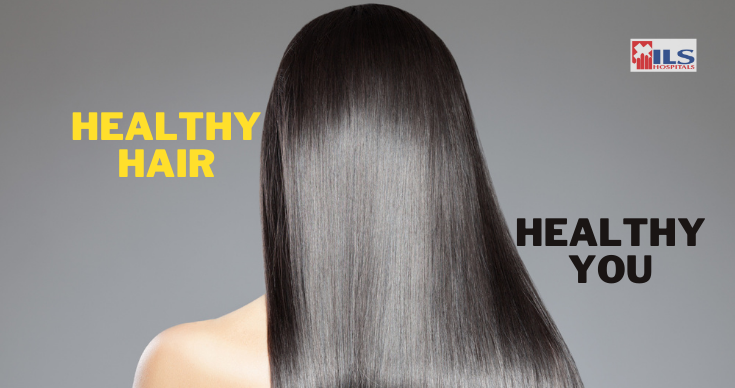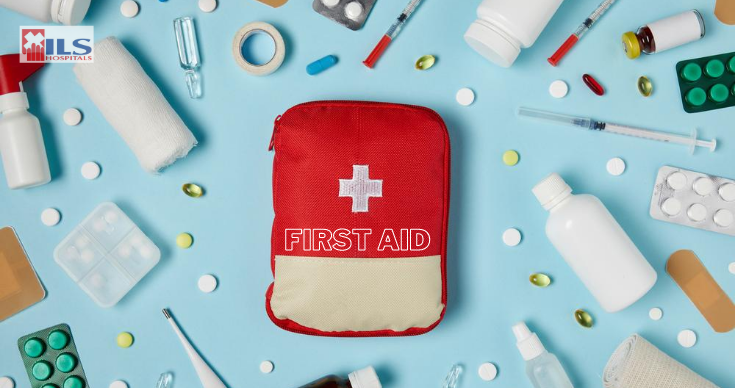ILS Speaks – Healthy Hair, Healthy You
Hair has been called crowning glory as it is symbolic to the person’s health, beauty, and overall personality. A luscious thick mane is always considered healthy and so to achieve that people use a lot of products and provide a lot of TLC to the hair.
Have you ever wondered what your hair is trying to tell you? Just like your nails, your hair has a lot to say about the health of your body. The condition of your hair can hint at serious diseases, like thyroid, anaemia, etc. as well.
In today’s blog, ILS Hospitals, one of the best hospitals in Kolkata and Agartala, will tell you what your hair is trying to tell you about your overall health. So, without any further ado, let’s proceed further.
Dull and lifeless hair
Dull and lifeless hair can happen due to a variety of reasons. You might make your hair dull and lifeless when you undergo chemical treatment, like hair colouring, rebonding, and other heat treatment or when you use harsh chemical-based products at home. From the medical point of view, dull and lifeless hair strictly indicates poor nutrition.
Solution: Eat lots of fruits, vegetables, and meat. Drink plenty of water and avoid harsh chemicals on your hair.
Grey or white hair
Grey or white hair is normal after you turn 35 years. But if you have white hair in your twenties then it is a matter of concern. The hair becomes white due to insufficient melanin, a pigment that gives hair its natural colour. This can happen due to vitamin B deficiency and stress.
Solution: Stay away from stress and eat vitamin B rich foods, such as eggs, fish, chicken, mutton, oysters, milk, whole grains, almonds, broccoli, spinach, bananas, avocados, bananas, and so on.
Thinning hair
Hair thinning or receding hairline occurs due to nutritional deficiencies or thyroid. Hyperthyroidism and hypothyroidism can cause hair loss in men and women. If you wish to know more about thyroid, read this blog: Your Complete Guide On Thyroid
Solution: Consult your medical professional, preferably visit ILS Hospital and get thyroid function tests.
Excessive hair fall
Losing 50-100 strands of hair a day is completely normal but if the hair strands exceed this normal range then it can indicate towards iron deficiency or anaemia.
Solution: Eat foods rich in iron, like chicken, fish, cashews, whole grains, fortified cereals, spinach, legumes, lentils, tofu, raisins, apricots, and so on. Also, get a blood test to check your haemoglobin levels.
Dry hair and scalp
Dry hair and scalp can mean that you are not getting healthy fats in your body. Also, dry hair and scalp can happen due to scalp diseases, like psoriasis.
Solution: Eat healthy fats, like eggs, cheese, avocados, fatty fishes, coconut oil, almonds, cashews, etc.
For other hair-related queries, visit ILS Hospitals in Kolkata and Agartala to consult our professional trichologists.
Medical Emergency: Things Paramount To Your First Aid Kit
First Aid Kit is something that should have its place in every house, office, restaurant, shop, and vehicle. You never know when a medical emergency might happen, so it’s always good to be prepared beforehand.
In today’s blog, ILS Hospitals, one of the best multispeciality hospitals in Kolkata and Agartala will enlighten you on First Aid Box essentials. Let’s take a look at things that must be inside your First Aid Kit.
Adhesive bandages
Adhesive bandages or conveniently called “band-aids” must be kept inside your First Aid Kit. Band-aids are commonly applied on common cuts to protect them from infection so that they don’t interfere with the healing process.
Antiseptic liquid
An antiseptic liquid needs to be there as it is used for removing germs from your wounds that might lead to infections if not cleaned properly.
Antiseptic cream/ointment
Keep a good antiseptic cream or ointment inside your First Aid Box so that you can apply one whenever you hurt yourself. Remember to always apply an antiseptic ointment after cleaning your wounds with a disinfectant or antiseptic liquid.
Medical cotton wool
It’s very obvious to keep medical cotton wool as you’ll need them to use on wounds as well as,while applying antiseptic liquid and ointment.
Medicated pain relief spray
Medicated pain relief spray is a must.You never know when you might get a sprain or backache.
Ice Pack
You should keep an Ice pack as it is very useful to minimize swelling post-injury.
Doctor’s approved pain relief medicines
Sometimes, taking medicines is the only option. In that case, always keep pain relief medicines after getting the medical professional’s nod.
Prescription medicines
If you have a specific health condition that requires you to take prescriptive medicines, then you can keep them inside your First Aid Box.
Antacids
Antacids are taken when one suffers from indigestion. Antacids neutralize the stomach acid and can be in any form – tablets or liquids. You can ask a medical professional to prescribe you some good antacids.
Decongestant
Seasonal changes can give you cough and cold. Nobody likes to deal with a runny nose and sore throat. That’s when decongestants come to the rescue. Surely, keep a good one.
Headache Roll-on/Balm
Headaches have become extremely normal in today’s hectic world. A headache roll-on or balm should be a part of your Medical Box. If you have migraine then consult your doctor to prescribe you an effective headache roll-on.
Sanitary napkins
Sometimes you or someone you know might get periods all of a sudden. So, it is crucial to keep sanitary napkins inside a First Aid Kit.
Hand sanitizer
A medical emergency can occur at any given moment and you may not get the chance to wash your hands before treating yourself or someone who needs First-Aid. That’s why you will have to keep an alcohol-infused hand sanitizer.
Thermometer
Keeping a thermometer is a smart choice. Nowadays, digital and no-contact infrared thermometers have come into prevalence.
Ensure there are no expired products inside your First Aid Box. For severe burns and other major injuries, First-Aid is not the ultimate cure. You have to report to the hospital’s ER in case of a serious medical emergency. Visit ILS Hospitals – Kolkata and Agartala for any medical emergency. Our ERs are well-equipped with the latest infrastructure and we provide 24*7 Emergency Care to our emergency patients in Kolkata and Agartala.
5 Common Habits That is Damaging Your Heart
We all know that eating a healthy diet and exercising regularly are important habits for a healthy heart. However, did you know that some surprisingly common habits have the potential to ruin all your efforts? It can lead to cardiac emergency and it would only be possible for hospitals that can save your life.
A number of activities that we do casually can have a negative impact on heart health. Let us know how these 5 common habits play major roles in damaging the heart and make us seek the best heart hospitals for treatment purpose.
1. Sitting All Day Long

People leading inactive lifestyle have double the risk of developing some of the other forms of cardiac ailments as compared to those who follow an active lifestyle.
If you are involved in sitting job and stay chained to the desk all day, then get up and take a five-minute walk after every hour or two. This small tweak in your routine can keep your arteries flexible and blood flowing properly, protecting your heart in a long run.
2. Overindulging in Alcohol

Drinking occasionally might not lead to any long-term effect, but frequent alcohol consumption is likely to cause high blood pressure, stroke, and obesity, all of which in turn, increase your risk for heart disease. It’s okay to have it once in a while but never regularly.
3. Stressing Too Much

Persistent stress makes the body to release adrenaline, which temporarily influences the body functions. When your heart rate increases, your blood pressure rises as well. Eventually, too much stress over a prolonged period can damage the heart’s blood and increase the risk for heart attack and stroke.
To minimize the harmful effects of stress, you can try to find a way to release stress. Sharing your feelings by talking with a trusted friend or family member is often helpful. Moreover, exercise can also relieve mental tension
4. Overdoing It on Salt

Excessive sodium can lead to high blood pressure, a risk factor for heart disease. Be sure to read nutrition labels and compare merchandises, before loading salt packages into your shopping trolley. Choosing the one with the lowest percent daily value for sodium is the best option to stick with.
5. Not Getting Enough Sleep

Inadequate sleep over a long period of time can lead to cardiovascular illnesses. The stages of sleep that are achieved only during complete sleep cycle throughout the night promotes cardiovascular health.
Chronic sleep deprivation is not only bad for the heart but for the overall health. It is recommended that adults get 7 to 8 hours of sleep each night.
All of these bad habits can make your heart sick, so do not follow your bad habits anymore, and adopt healthy habits instead. You will see the changes in your health, all by yourself.
Read more – Five Most Common Heart Diseases that have been Explained by Cardiologists













